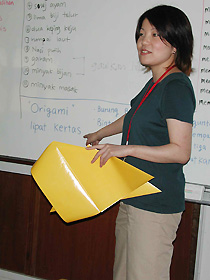
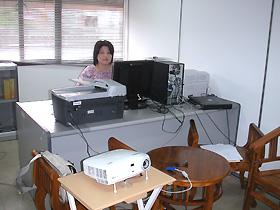
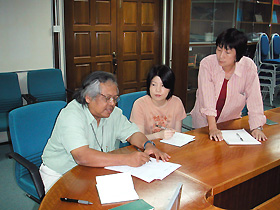
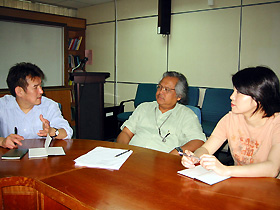
(Prof. Shamsul, KATO Yuko and KAWANO Motoko)
(Prof. Shamsul, NAGATSU Kazufumi and KATO Yuko)
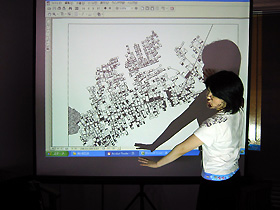
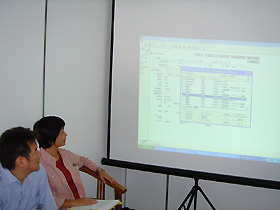
(KATO Yuko)
(NAGATSU Kazufumi and KAWANO Motoko)
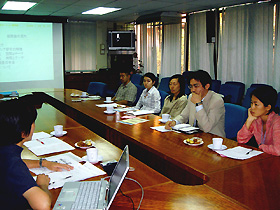
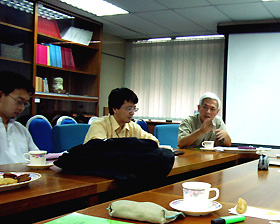
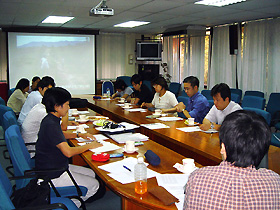
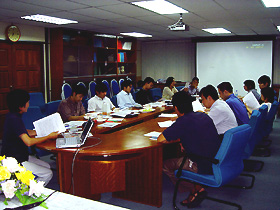
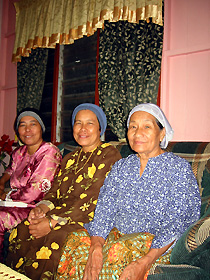
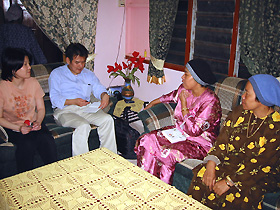
(NAGATSU and KATO)
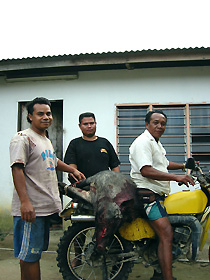
Bangi FS provides research support for ASAFAS graduate students as one of the pillars of its activities. This fiscal year, as last year, three graduate students were engaged in on-site research and literature research with Bangi FS as their base. One of them is receiving funding from the 21st Century COE Program. Each of the students received advice on research from faculty members of ATMA and other institutes of UKM. They also discussed their respective research themes and methods of on-site research and literature research with graduate students and young faculty members of UKM. Another graduate student was conducting on-site research in Singapore with funding from the 21st Century COE Program. An outline of the four students' research is as follows.
- KAWANO Motoko, Division of Southeast Asian Area Studies (Society and Development) (enrolled in FY1999), dispatched by the FY2004 21st Century COE Program
Research period: July 2004 - March 2005
Research area: Terengganu State
Research theme: Historical dynamics of small-scale fisheries and ethnic relations during the New Economic Policy: Social reorganization of Malay fishing villages and its featuresThe New Economic Policy introduced in 1971 by the Malaysian federal governmentgives preferential socio-economic treatment to ethnic Malays and indigenous peoples, the so-called "Bumi Putri Policy." KAWANO is conducting research in Malay villages and fishing ports on how technical innovations in fishing and deep-sea fishing in Terengganu State on Malaysia's east coast have been promoted and how marine products distributors and small-scale fishing people were adapting to the fishery modernization policies.
- KATO Yuko, Division of Southeast Asian Area Studies (Society and Development), (enrolled in FY2000)
Research period: June 2004 to March 2005
Research site: Selangor State
Research theme: The social history of childbirth practices in Malaysia, with a focus on women and midwives in rural MalaysiaAfter taking a class in the Malay language from June to September 2004 at ATMA, KATO began research on birth practices in Hulu Langat, a Malay village of ethnic Minangkabau. Taking down the personal histories of midwives and women, she is studying changes in the role of traditional midwives in rural Malaysia and changes in villagers' delivery practice, customs, and thinking since the 1970s, when hospitalization of childbirth and medical care rapidly became the norm. (KATO was dispatched to the Bangi FS in 2003 under the 21st Century COE Program.)
- NAITO Daisuke, Division of Southeast Asian Area Studies (Environment, Society and Culture), (enrolled in FY2003), planned dispatch under the FY2005 21st Century COE Program
Research period: June - December 2004 (preliminary research)
Research site: Negeri Sembilan State
Research theme: Orang Asli The forest certification system and its impact on an Orang Asli community in peninsular MalaysiaNAITO studied the literature at the Forestry Department of Peninsular Malaysia and NGOs on the forest certification system implemented in Malaysia from the latter half of the 1990s, a system that gives certification recognizing sustainable forest management according to a certain standard and that promotes lumber production based on that certification. At the same time he conducted a preliminary survey in a village of indigenous people, generally referred to as "Orang Asli," in Negeri Sembilian State on how the Orang Asli, who depend for their livelihood on hunting and gathering in the forest, regard the forest certification system.
- TAKAHASHI Miyuki, Division of Southeast Asian Area Studies (Society and Development), (enrolled as a third year student in FY2002), dispatched by the FY2004 21st Century COE Program
Research period: December 2004 - January 2005
Research site: Singapore
Research theme: Singapore's ethnic Chinese society: Multiple aspects of young mothers' language useTAKAHASHI studied the literature on changes in language education in Singapore and the present situation of English education. At the same time she interviewed mainly ethnic Chinese women living in public housing in the Ang Mo Koi district of Singapore about the co-relation between disparities in generation, schooling and standard of living and changes in the use of language.
NAGATSU, along with KAWANO and KATO, visited Hulu Langat, the Minangkabau-Malay village in Selangor State that is KATO's research site and heard from her host family about their history of migration and changes in medical practices, including childbirth. From their observations and interviews in Hulu Langat, the three discussed the interconnectedness of changes in medical practices in the village and the macro political-context, such as the penetration of the New Economic Policy, the spread of the Islamic Revival Movement and the improvement of the health care system. The three also visited an Orang Asli village in Selangor and heard from the villagers about the state of health care facilities there.
NAGATSU, KAWANO and KATO also held a study meeting with Prof. Shamsul of ATMA on local administrative systems in Malyasia. At the meeting they were given a lecture by Prof. Shamsul on how to investigate Malaysian administrative systems.
In February KATO Tsuyoshi visited the Bangi FS and conducted on-site education with KAWANO Motoko and KATO Yuko. He discussed with KAWANO how small-scale fishing people in Terengganu State maintain their livelihood and pointed out the need for pursuing in concrete terms the historical process of its continuity and change, given the economic relationships on various levels, from mutual aid on the village level to development assistance to small-scale fishing people by government bodies. He advised KATO Yuko to learn the ethnic descent and economic base of political leaders on the village and parish levels at an early stage of her research.
- The British North Borneo Herald, 1883 - 941, a government publication of North Borneo (present day Sabah State) during the colonial period
- Annual Reports, Department of Health, Selangor, a government publication on delivery care in Selangor State
- Annual Reports, Fisheries Development Authority of Malaysia (LKIM, nationwide version)
http://areainfo.asafas.kyoto-u.ac.jp/japan/fsws/2005_malaysia/20050120.html
>>Report of Faculty Members:FY2004
>>Report of Students:FY2004